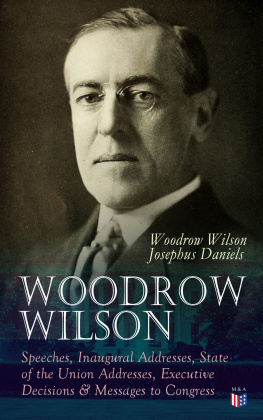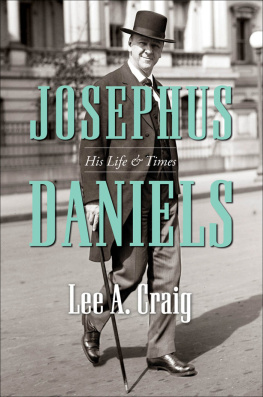Woodrow Wilson, Josephus Daniels
Woodrow Wilson: Speeches, Inaugural Addresses, State of the Union Addresses, Executive Decisions & Messages to Congress
Madison & Adams Press, 2018.
Contact:
ISBN 978-80-268-9406-3
This is a publication of Madison & Adams Press. Our production consists of thoroughly prepared educational & informative editions: Advice & How-To Books, Encyclopedias, Law Anthologies, Declassified Documents, Legal & Criminal Files, Historical Books, Scientific & Medical Publications, Technical Handbooks and Manuals. All our publications are meticulously edited and formatted to the highest digital standard. The main goal of Madison & Adams Press is to make all informative books and records accessible to everyone in a high quality digital and print form.
Biography of Woodrow Wilson

Woodrow Wilson
By Josephus Daniels
Woodrow Wilson is descended from a Scotch-Irish ancestry noted for its culture and its intensity of religious conviction. Some of his Scot forbears died for their faith. Immediately, he comes from a line of ministers and editors. William Duane, democrat and friend of Jefferson, had a hand in the training of James Wilson, grandfather of Woodrow Wilson, who came from County Down, Ireland, lured as a youth of twenty-two to the land of opportunity in the New World. Landing at Philadelphia in the year 1808, he quickly found a congenial task in the work rooms of Duane's militant Daily Aurora. The joy of his new toil was enhanced by the fact that a fine Irish lass, who had sailed on the same ship with him, was watching him make his fortune; and within four years he was able to claim Ann Adams as his wife. The happy pair could not be disobedient to the enticing vision of the developing West, and in 1812 James Wilson founded the Western Herald at Steubenville, Ohio, and soon afterward the Pennsylvania Advocate at Pittsburg, Pennsylvania, and divided his time between the two newspapers.
As Providence would have it, Joseph Ruggles Wilson, youngest of seven sons and three daughters, was marked to be the scholar of the family. Trained by his parents, and especially by his mother, who was a Presbyterian of the straitest sect, it was not surprising that he turned to the Gospel ministry as his calling. The stair steps in his education were the Steubenville Academy; Jefferson College, afterwards Washington and Jefferson College, where he took first honors; and a year each at Western Theological Seminary at Allegheny, Pennsylvania, and Princeton Seminary.
The Reverend Doctor Thomas Woodrow, English-descended but Scotch-born, some years before had left his church at Carlisle, England, to become a missionary in the New World, and had finally come to Chillicothe, Ohio. It came about that he sent his pretty and sprightly daughter, Janet, sometimes called Jessie, to the girls school at Steubenville at the same time that Joseph R. Wilson had returned to that place to teach for a couple of years in the male academy. Finding their tastes congenial and their ideals alike, these two were happily married on June 7, 1849, and after teaching rhetoric for a year at Jefferson College, and chemistry and the natural sciences for four years at Hampden Sidney College, Virginia, the young husband accepted a call to the pastorate of the Presbyterian church at Staunton, Virginia, in the year 1855, and moved there with his wife and two small daughters, Marian and Annie Josephine.
Staunton was the birthplace of Woodrow Wilson. As his father left there when he was two years old to accept a call to the important First Presbyterian church of Augusta, Georgia, he had no recollection of the home of his nativity in the beautiful valley of Virginia, but he will never for get the reception tendered him by citizens of that city upon the fifty-seventh anniversary of his birth, on December 28, 1912, when he was President-elect of the United States, and when he was quartered in the little room in the manse where he first saw the light.
Both at Augusta and at Columbia, South Carolina, where Doctor Wilson in 1870 accepted the chair of pastoral and evangelistic theology at the Southern Presbyterian Theological Seminary, Woodrow attended excellent private schools, but his real instructor was his father. Doctor Wilson was one of the brilliant leaders of the Presbyterian Church in the south. For forty years he was Stated Clerk of the Southern General Assembly. He was Moderator of the Assembly of 1879. Well-informed upon the news of the day and well-balanced and fair-minded, the father was keen to judge a new book, to analyze a political situation, to shatter a sham with irony, or to scorn a pretender. From him all the while the boy was unconsciously absorbing the ability to do the same things.
Wilson's decision as to his life purpose was formed suddenly. He had spent a year at Davidson College, North Carolina, an excellent institution with a strong faculty, and then a year at his new home in Wilmington, North Carolina, whither his father had been called from Columbia to the Presbyterian pastorate. In the early fall of 1875 he entered Princeton, then under the presidency of Doctor James McCosh. About three months had passed when young Wilson, while browsing in the library, took down a file of the Gentlemen's Magazine and turned to the series of articles entitled Men and Manners in Parliament, written by The Member for Chiltern Hundreds, the anonymous successor of Doctor Johnson. Wilson was captivated by these vivid reports of the parliamentary debates participated in by Gladstone, Disraeli, John Bright, Earl Granville, Sir William Vernon Harcourt and other figures in the public eye of England at that time. He eagerly devoured the entire series, and went on to the earnest study of English political history. He does not hesitate to confess that this was a turning point in his life and that no other circumstance did so much to make public life the purpose of his existence. In his senior year, Wilson embodied his conclusions in an article entitled Cabinet Government in the United States, which was instantly accepted by the International Review and published in August, 1879. His criticism was that in Congress the important legislation was shaped in committee; and secrecy, he contended, is the atmosphere in which all corruption and evil flourish. To remedy the evil of committee government, which he attributed to lack of leaders, he devised a plan whereby Cabinet members should be entitled to a seat in Congress, and the right to participate in the debates, even if it were deemed advisable not to give them the right to vote. All through his later voluminous writings, Wilson clung to this theory and put the idea into practice, so far as he could, with marked effect, when he came to be the head of the nation, by personally appearing before joint meetings of both houses of Congress and reading his messages.
One effect of Wilson's selection of a career so early in his college course was to induce him to select all his studies with a view to it, and to reject as unsuited both to his tastes and his needs the rigid and inflexible curriculum then prescribed at Princeton. As illustrating how he reached for anything which would help him in his career, he went outside the campus to learn stenography so that he might the more easily make notes during his library work. This acquirement has proved an invaluable aid to him throughout his life, and all his public papers were originally prepared in the characters of the stenographic art. He was a famous and dreaded debater, belonging to Whig Hall, at Princeton, and it was conceded that he stood the best chance to win the Lynde Debate, an extemporaneous discussion participated in by three representatives from each of the two literary societies. But when in the preliminary trial in his society he drew out of the hat a slip labeled Protection, requiring him to defend that side, he refused to participate in the debate at all, because he could not advocate what he did not believe.












